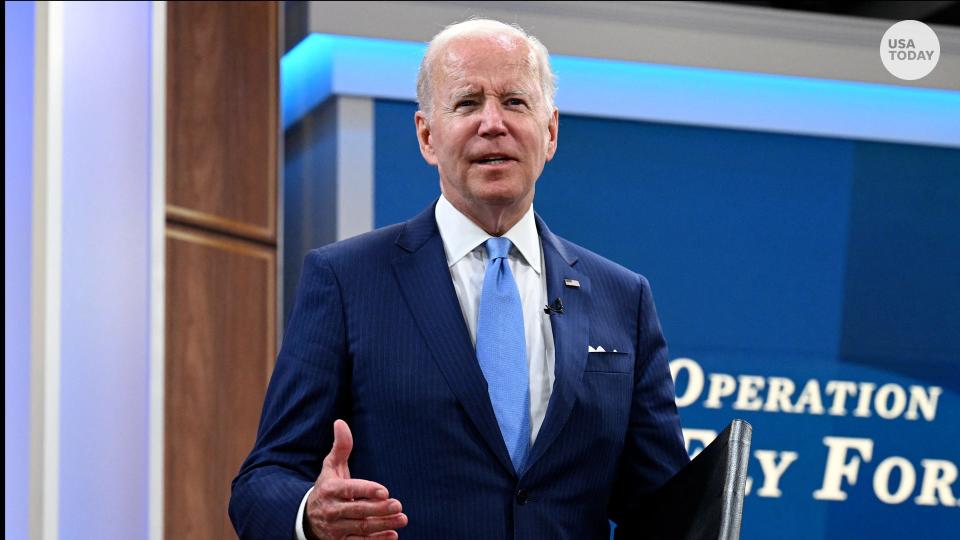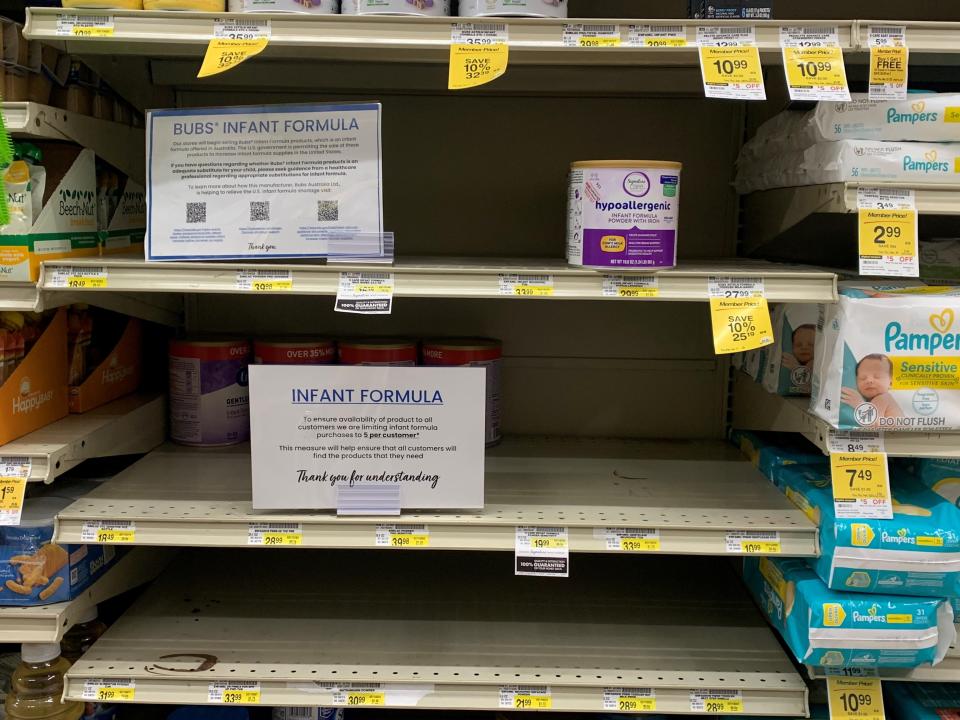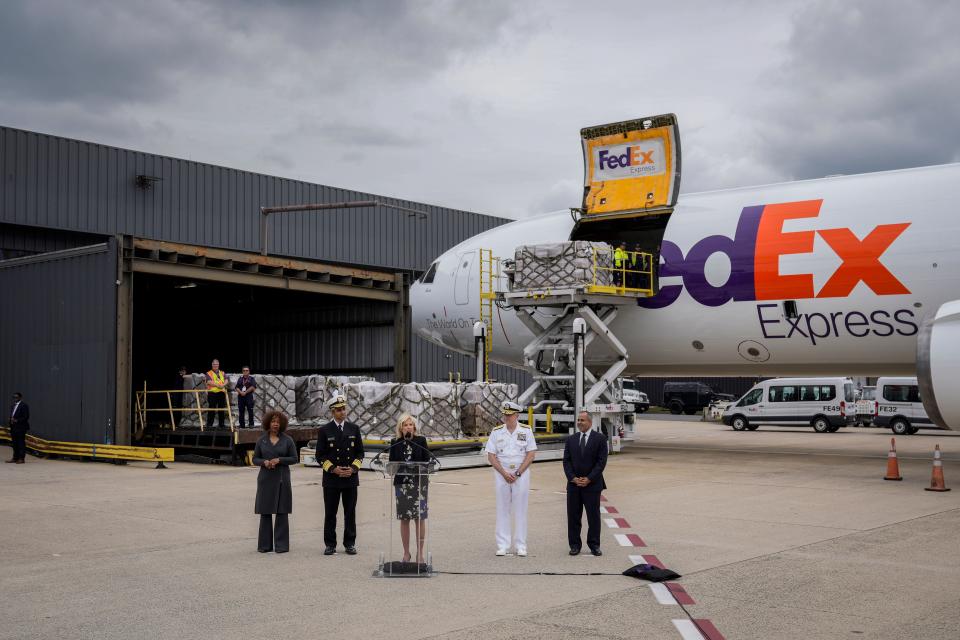'In desperate need': Moms still search frantically for baby formula months after shortage
- Oops!Something went wrong.Please try again later.
The anguish is palpable and heartbreaking as mothers still are frantically searching for baby formula to feed their babies.
“In desperate need, it’s the only thing my daughter can tolerate,” one wrote on Facebook just before Thanksgiving. “I’m having a difficult time,” another pleaded.
Shelves are bare in some places. Stores still are rationing sales.
“A lot of moms are really, really worried,” said Pennsylvania mother Stephany Gamez, who turned to social media in recent weeks to try to find hypoallergenic formula for her infant daughter. She said in an interview with USA TODAY that she managed to score three cans last week from a friend of her husband's who found them on a business trip to California. “Right now, it's just crazy.”
It has been nearly 10 months since the country's largest manufacturer recalled formula and shuttered production at a Michigan plant, sending the market into a tailspin and the Biden administration scrambling to address nationwide shortages that grew so bad malnourished babies had to be hospitalized.
What has been recalled in 2022? Your complete database on all recalls, from food to cars.

Actions taken by President Joe Biden and his administration greatly improved supplies, consumer advocates and lawmakers say. But problems remain, and more is needed, both to increase current supplies and prevent future shortages.
“It's still impacting consumers. If you ask the FDA, they say everything is OK. But if you ask the new mother or the Facebook group that, they still can't find it, or even in your neighborhood, it is still a problem,” Mitzi Baum, CEO of consumer advocacy group Stop Foodborne Illness, told USA TODAY. “It's a problem."
Kansas Republican Sen. Roger Marshall, an OB-GYN, set up a page on his website to help desperate parents and caregivers access formula and has been strafing the Biden administration with inquiries about the crisis. In a statement provided to USA TODAY, he accused the administration of relying on "band aid policies" that have failed to adequately mitigate the shortages.
“The FDA’s track record this year raises serious questions about the Biden administration’s handling of the infant formula shortage," Marshall said. "It is a sad day when it’s easier to find fentanyl than it is to find formula.”
Biden welcomes Macron: Biden open to 'tweaks,' not an overhaul, of climate subsidies opposed by Macron
Administration officials say formula production now is outpacing levels before the recall, and in-stock rates are approaching what they were before, but they acknowledge more needs to be done to ensure all the formula gets where it's needed.
Dr. Susan Mayne, director of the FDA's Center for Food Safety and Applied Nutrition, said in an interview Friday that the administration has made steady progress to address the crisis.
"We're encouraged by that progress," she said. "There's some work to be done, as we indicated. But we really are working to address this not just in the short run, but in the long run using the tools that we have at FDA."
How wide are the baby formula shortages?

Adults in more than a third of households with infants who use formula still had trouble finding it as of mid-November, U.S. census data show.
The census survey, administered since 2020 to gauge a number of consequences of the COVID-19 pandemic, found 34% had difficulty getting infant formula within the past week. The U.S. Census cautions the data are experimental and have limits, including small sample sizes in some cases. But the survey provides one of the broadest, if rough, snapshots of consumer experience.
Overall, market research data show formula supplies are much improved since cratering over the summer. Out-of-stock rates for powdered formula, the subject of the recall, went from roughly 10% in February to more than 30% in July, data from IRI, a market research company, show. As of mid-November, national out-of-stock rates are about 13%.
Krishnakumar “KK” Davey, a president and consumer analytics specialist at IRI, told USA TODAY that manufacturers ramped up production of the most widely used formula products to feed as many babies as possible, but some of the lesser-used ones still may not be as widely available.
He said some of the shortages also can be blamed on customers stockpiling for fear of running out.
Roughly 75% of parents and caregivers in the U.S. use baby formula to help meet the nutritional needs of infants up to 6 months old.
For some, when it comes to special types of formula, the shortages could prove jarring. “If my baby drinks only XYZ and it is not available, that's a big problem for me,” Davey said.
Georgia runoff is Tuesday: Super PACs spending $16M more on Raphael Warnock than Herschel Walker in Georgia runoff
How did we get here? Cronobacter, infant deaths and lagging FDA action
FDA inspectors found sanitation problems and signs of contamination at an Abbott Nutrition manufacturing plant in Sturgis, Michigan, which prompted Abbott in February to recall formula produced at the factory and shut down production.
The FDA had received reports that babies who had consumed powdered formula made at the factory were sickened with cronobacter, a bacterial infection that can cause severe illness and death. Two babies died. None of the illnesses or deaths could be definitively linked with available strains of cronobacter found at the factory.
The shutdown sent the infant formula market into a dive. Abbott provides more than 40% of the country’s supply of baby formula, and a quarter came from the Michigan plant. By May, popular brands were sold out across the country, stores began rationing sales of the formula they had, and malnourished infants were hospitalized.

Hauled before lawmakers on Capitol Hill to provide answers, FDA Commissioner Dr. Robert Califf acknowledged the agency had been slow to act on reports of problems at the Abbott facility and didn’t do enough to offset the loss of formula production. "Some decisions in retrospect could have been more optimal," Califf said at the time.
In response to many questions about the agency's workflow and timeliness, he simply said, "We don't have a great answer."
Abbott Nutrition said in a statement last week that it restarted production at its plant in Michigan in July, began adding more products to the line in September, and amped up formula production and shipping from Europe.
“We’re doing everything we can to help get formula into moms’ and caregivers’ hands,” the statement provided by spokesman John Koval said.
Baby formula shortage: Baby formula shortage hits low-income women, moms of color hardest. Can we fix things?
What is Biden doing to fix baby formula shortages?
After initially swatting away suggestions that his administration could have acted sooner, the president in mid-May shifted into high gear to address the crisis. Biden, who said he wasn’t notified until April, used wartime powers to speed formula production and directed his administration to do all it could to get formula back on shelves.

The administration worked with retailers and manufacturers to increase supplies, airlifted formula from overseas, and loosened restrictions on foreign manufacturers.
The FDA issued a report in September revealing the results of an internal review of the agency’s handling of the crisis. It did not assign specific blame and pointed instead to a “confluence of systemic vulnerabilities” that led to what happened, drawing criticism from lawmakers and food safety advocates that it was a vague and superficial review.
“There was a lot of language that ‘We should review, we should assess,’ but there was no accountability for what happened,” said Baum, of Stop Foodborne Illness. “Nor were there specific action items about what could be or what should be actions taken to prevent it again.”
Formula problems apparent before Biden alerted: Biden says he was alerted to baby formula shortage in April - but problems were apparent months ago
North Carolina Sen. Richard Burr, lead Republican on the Senate Committee on Health, Education, Labor and Pensions, which oversees the FDA, said the review fell "woefully short of the substantive analysis and accountability needed."
Califf told POLITICO at the time that the intent had been to “identify themes of issues” FDA needs to improve. “We’re not going to spend a lot of time going back,” he said. “We’re going to spend our time taking into account what happened then and moving forward.”
Mayne, head of the agency's Center for Food Safety and Applied Nutrition, said Friday that FDA officials are taking steps to implement recommendations from the review, which included doing more to understand the science surrounding cronobacter.

What now? Is it enough to ease concerns about baby formula shortages? Some say no.
Last month, the FDA issued a new strategy to help prevent future cronobacter outbreaks from formula consumption, including adding the infection to a list of illnesses that must be reported to public health authorities. Right now, only Minnesota requires reporting of cronobacter.
The agency also has taken steps to allow more manufacturers to sell formula in the U.S. in the long term to lessen the chances that problems with a single manufacturer will cause such widespread havoc.
“I think the agency has already taken several important concrete steps forward and will continue to do so as we work to try to prevent something like this happening in the future,” Mayne said.
A separate review of the structure of the FDA’s food safety programs and oversight is scheduled to be finished this week; results are due Tuesday. The inquiry is being overseen by the Reagan-Udall Foundation, an independent organization created by Congress to help the agency. The evaluation is expected to focus on “leadership, authorities, resources, and culture” at the FDA.
Baby formula shortage: FDA chief admits federal regulators were 'too slow' to act
Advocates applauded the actions the Biden administration has taken but said a thorough review is crucial to future prevention.
"A formal assessment for how we arrived at this point is imperative," said Dr. Jamila Taylor, president and CEO of the National WIC Association. "We must ensure better oversight from the FDA to guarantee safety standards are being met so that an entire plant isn’t forced to shut down."

Key lawmakers are poised to take action in Congress. Rep. Rosa DeLauro, D-Conn., plans to introduce legislation to foster more competition in the formula market by supporting smaller manufacturers. "Just four companies control 90 percent of our domestic supply of infant formula. That must end," she told USA TODAY in a statement.
DeLauro, chair of the House Appropriations Committee until Republicans take over the chamber in January, said it will be important also to bolster food safety oversight at the FDA with more inspection staff and better oversight.
"Here’s the bottom line: I believe the current formula shortage could have been avoided, and we should do all we can to prevent similar shortages from occurring in the future,” she said.
Marshall, the senator and OB-GYN from Kansas, joined other Republican senators in asking the Government Accountability Office to study the effect on the formula supply of the Special Supplemental Nutrition Program for Women, Infants, and Children, or WIC, program. The GAO review is ongoing.
Parents 'just trying to feed their new babies'
Gamez gave birth in February, and by 2 months old, her baby daughter had tummy problems, prompting her doctor to recommend feeding her hypoallergenic formula.
“I remembered right away I drove like an hour maybe and there were six cans,” she said. Her doctor tided her over the height of shortages with another three sample cans. “So we survived with those.”

Her daughter is now transitioning bit by bit to regular formula, but Gamez worries about other mothers. “At least my baby can tolerate now some other formula, but I know for a lot of moms … their babies, they only tolerate this formula,” she said.
“And it's just hard to find it. I mean, you go to the stores and there's nothing there and not even online and it's just hard to trust people around Facebook,” Gamez said. “I also called the doctor last week, and I asked them for some sample cans, but they say 'I'm sorry, we don't have any more samples to provide right now.'”
Baum, the food safety consumer advocate, suggested the plight of mothers like her can sometimes get lost amid the focus on market and government reforms.
"There are a whole host of issues associated with this," she said. "But in the end, the people that end up paying the price are the consumers, are the parents that are just trying to feed their new babies.”
Pomp, pageantry, and fraternité: Memorable moments from Macron's state visit with the Bidens
This article originally appeared on USA TODAY: Baby formula shortages persist months after Biden scramble for fixes

